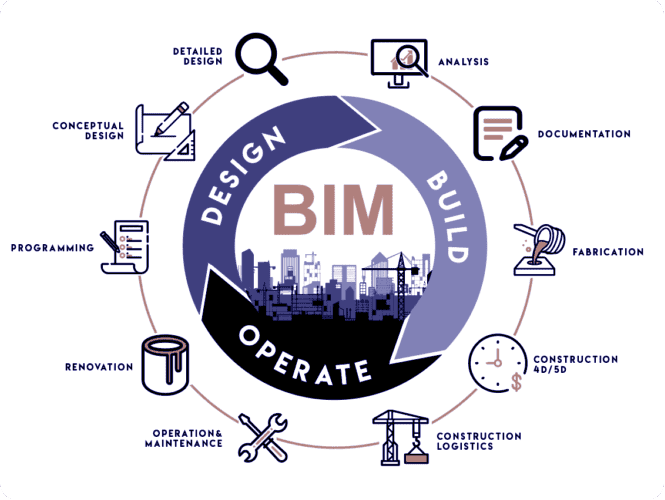
BIM Services for Contractors
Embracing Innovation in Construction with BIM
In the ever-evolving realm of construction, staying ahead of the curve is not just a choice but a necessity. One such revolutionary tool transforming the landscape is Building Information Modeling (BIM). In this article, we delve into the significance of BIM for contractors, exploring how this technology can elevate project efficiency to unprecedented levels.
Understanding the Essence of BIM
Before delving into the myriad benefits, let's demystify what BIM truly entails. BIM is not just a tool; it's a collaborative process that utilizes a digital representation of the physical and functional characteristics of a facility. From design and construction to operation and maintenance, BIM integrates information to streamline processes and enhance communication among stakeholders.
Streamlining Construction Processes with BIM
- Optimizing Design and Planning: BIM acts as a digital blueprint, offering contractors a comprehensive overview of the entire project. This aids in meticulous planning, minimizing errors, and ensuring optimal resource utilization. By visualizing the project in a virtual environment, contractors can identify potential challenges early on, paving the way for smoother construction phases.
- Enhanced Collaboration Across Teams: The collaborative nature of BIM fosters improved communication and coordination among project stakeholders. Architects, engineers, and contractors can seamlessly share information, reducing the risk of misunderstandings and discrepancies. This streamlined collaboration translates into a more synchronized and efficient construction process.
BIM's Impact on Project Efficiency
- Real-time Updates and Monitoring: BIM offers real-time updates on project developments, allowing contractors to monitor progress with precision. This level of transparency ensures that everyone involved is on the same page, facilitating quick decision-making and problem-solving. Timely interventions based on accurate data contribute significantly to project efficiency.
- Cost Savings Through Improved Accuracy: The accuracy of BIM models minimizes the likelihood of costly errors during construction. Contractors can anticipate challenges and address them proactively, preventing rework and unnecessary expenses. This not only enhances efficiency but also contributes to the overall cost-effectiveness of the project.
- Project Scheduling and Planning: BIM enables contractors to create detailed project schedules and plans. The virtual model facilitates the identification of potential clashes and conflicts, allowing for adjustments before the construction phase begins. This proactive approach enhances project efficiency and reduces delays.
- Risk Mitigation: BIM helps in identifying potential risks and issues before they become critical problems during construction. Contractors can simulate different scenarios, assess their impact, and implement preventive measures, thereby minimizing the likelihood of costly mistakes.
- Quality Control: BIM enables contractors to monitor and control the quality of construction through detailed visualization and analysis. This ensures that the final deliverables meet the specified standards and requirements.
Facilities Management: Beyond construction, BIM supports facilities management by providing a comprehensive digital record of the built environment. This aids in efficient maintenance, renovations, and future expansions.
Harnessing the Potential of BIM for Future Success
- Future-Proofing Construction Projects: As technology continues to advance, embracing BIM positions contractors at the forefront of innovation. By integrating this cutting-edge tool into their workflow, contractors future-proof their projects, staying resilient in an industry that demands adaptability.
- Adapting to Changing Regulations:With an increasing emphasis on sustainable and efficient construction practices, BIM aligns seamlessly with evolving industry regulations. Contractors utilizing BIM are better equipped to comply with stringent standards, ensuring their projects meet and exceed expectations.
Why Choose Our BIM-Integrated Contractor Services?
- Expertise and Experience: Our team of contractors possesses extensive expertise and experience in leveraging BIM for construction projects. We have successfully implemented BIM in a variety of projects, demonstrating our proficiency in harnessing this technology for optimal results.
- Efficiency and Accuracy: By choosing our services, clients benefit from the efficiency and accuracy that BIM brings to the construction process. We prioritize precision in cost estimation, scheduling, and project execution, resulting in streamlined workflows and successful project outcomes.
- Collaborative Approach: We embrace a collaborative approach, working closely with architects, engineers, and other stakeholders to ensure seamless communication and coordination. BIM serves as the backbone of our collaborative efforts, fostering a cohesive and integrated project environment.
- Innovation and Future-Readiness: Our commitment to innovation and staying ahead of industry trends positions us as a forward-thinking contractor. By incorporating BIM into our services, we demonstrate a dedication to adopting cutting-edge technologies that enhance project delivery and client satisfaction.
- Risk Mitigation and Quality Assurance: Our utilization of BIM extends beyond project planning to comprehensive risk mitigation and quality assurance. Clients can trust our ability to identify and address potential challenges early in the process, ensuring the highest standards of construction quality.
- Client-Centric Solutions: We prioritize our clients' needs and objectives, tailoring our services to meet specific requirements. BIM enables us to provide personalized solutions, fostering a client-centric approach that leads to successful project outcomes and satisfied customers.
Conclusion
In conclusion, the transformative power of BIM for contractors cannot be overstated. From optimizing design processes to enhancing collaboration and ensuring real-time project monitoring, BIM emerges as a game-changer. As the construction industry evolves, embracing BIM is not just a choice; it's a strategic imperative for those aiming to thrive in the future of construction.
By choosing a contractor that embraces BIM, individuals and companies can benefit from increased efficiency, accuracy, and innovation, ultimately ensuring the success of their construction projects.

